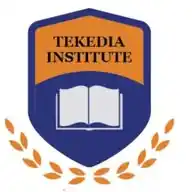
Tekedia Institute
926 subscribers
About Tekedia Institute
Welcome to the Tekedia Institute WhatsApp Channel. Tekedia Institute is a world-class business school which educates on the fundamental constructs of leadership, management, entrepreneurship, and innovation, across all market sectors and business territories. With more than 250 faculty members, and learners from more than 41 countries, it attracts thousands of professionals, CEOs, founders, students, etc yearly. This school will help you unlock a treasure trove of business education resources, including articles, videos, and guides, designed to equip you with the skills and knowledge needed to succeed. Our WhatsApp channel is your gateway to a wealth of business education and support to help you build the finest startups that thrive in the market. Here you will connect with a vibrant community of like-minded innovators and entrepreneurs who share your passion for creating the next big thing. Discover strategies and best practices that will set your startup apart and give you a competitive edge. Our contact: +2347035670954 [email protected] school.tekedia.com
Similar Channels
Swipe to see more
Posts

Registration for the next Tekedia Mini-MBA early bird benefit is ending this Friday May 23rd. Class begins June 9, 2025. Ready to register, chat +2347035670954

So I want to tell you something they will not teach you in the classroom. Building a business is 100x harder than you think. Many people get into entrepreneurship with the wrong expectations. There is a very high chance that your first business will not survive two years abi let alone be profitable. That does not mean it's a failure or you shouldn't venture into one. You can launch to test what really works, and in the process gain some valuable experience to do better in your next attempt. That you spend plenty money building and launching a product is not a guarantee for anything, all the money spent might have done its job if you are able to learn something new. With the new insights and practical experience, you could subsequently launch what will eventually thrive and be insanely profitable. If you are waiting to build what will be profitable at your first attempt, you may never stand a chance. Want to learn how builders build? Join the next Tekedia Mini-MBA starting June 9, 2025. To begin your registration, chat +2347035670954


Imagine a startup that grows revenue from ₦1.5 billion in 2023 to ₦3 billion in 2024. Impressive, right? Now convert that to dollars. At ₦500/$, ₦1.5B = $3M. At ₦1,500/$, ₦3B = $2M. Despite doubling revenue in Naira terms, yet your USD valuation dropped significantly. This is what most Nigerian startups are facing. Growth on paper, but reduced perceived value to global investors. Someone may want to ask: why do Nigerian startups care about their valuation in dollar? Here’s why: Startups in Nigeria are like locally manufactured products designed for international export. Just like a manufacturer exporting palm oil abroad must watch the global oil price, Nigerian startups must watch the USD—because it’s the scoreboard the world reads. They may be built in Lagos, but from day one, they are designed to think globally. Why? Because investors speak one language—USD and the true measure of scale, relevance, and investment—in today’s venture world—is denominated in dollars, not Naira. To investors, a business valued in Naira is like a book written in an unknown script. If the dollar value doesn’t rise, investors don’t care how hard you’re working. That’s why many Nigerian startup founders incorporate abroad. It’s not betrayal—it’s strategy. And yes even though Nigeria’s startups are locally made. But they are globally pitched. This is why naira devaluation hits startups that pick Nigeria as their primary market so hard. A startup that earns ₦3 billion in 2025 might appear less valuable than when it earned ₦1.5 billion in 2023. Simply because the exchange rate doubled from ₦805/$ to ₦1,600/$. Yesterday my professor, Ndubuisi Ekekwe showed us that foreign exchange instability in Nigeria is killing investor confidence(link to post in the comment section). If you Invest $1M today in a Nigerian startup, your returns in 3 years might have reduced by half, just because of currency losses. So what do investors do? They pause. They delay. They walk away. As that happen, Nigerian innovation suffers. We need national focus on FX stability. Not just for imports—but for innovation. Because no matter how great your tech is, if the economics don’t work, the cheque never gets signed.
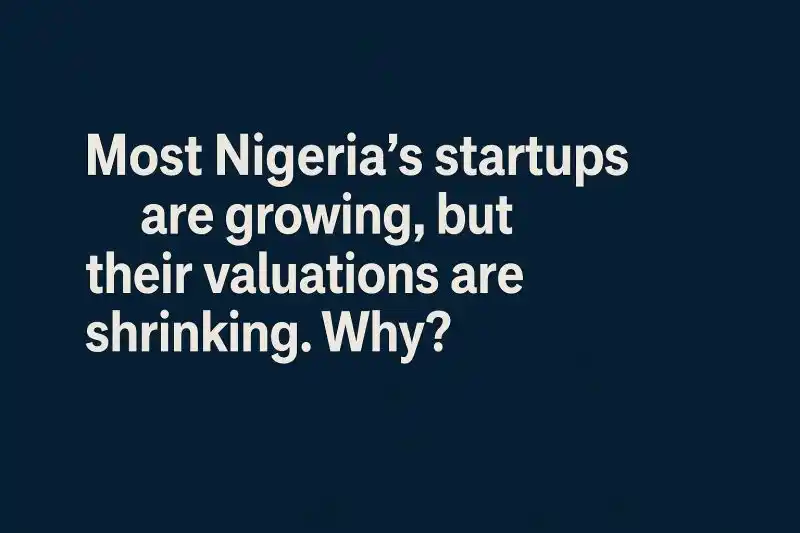

I stumbled on Nairametrics recent LinkedIn post titled "This is why your Naira can’t breathe" The post highlighted that despite many Nigerians earning and spending in Naira, they still feel the heat of the dollar–Naira exchange rate. At first glance, some may say, “I live in Nigeria, earn in Naira, so why should the dollar affect me?” My brother(in Sarki Mota Autos voice) It’s not about living in America or Nigeria. It’s about how Nigeria economic trade connect to the dollar. Whether you agree or disagree, until Nigeria transforms its industrial base and starts focusing on powering factories, enabling efficient warehouses, and reducing import reliance — the dollar’s fluctuations will continue to send shockwaves through the economy, impacting prices, businesses, and households alike. My professor, Ndubuisi Ekekwe once wrote that "the strength of the Naira comes not from Central Bank but from real economic production — factories making goods, warehouses holding local products." Simply, the more we produce locally, the less the dollarization of the Nigeria economy. Every time a factory shuts down in Nigeria, it means fewer goods are produced locally, more imports flood the market, and more dollars are demanded. This creates pressure on our currency. The Naira gasps for breath because the source of its oxygen — local production — is choked. Many see warehouses as mere storage spaces, but they are in fact the vaults of economic strength. Warehouses that hold locally produced goods represent tangible value that backs the Naira. A warehouse full of locally manufactured goods reduces import demand, and sustains the currency’s value. When warehouses lie empty or are stocked only with imported goods, it signals weakness which is bad for our economy. To make the Naira breathe, Nigeria must power factories and make warehouses functional by ensuring goods produced in our factories reach the market efficiently. These warehouses are not just spaces; they are the frontline of our currency’s resilience.
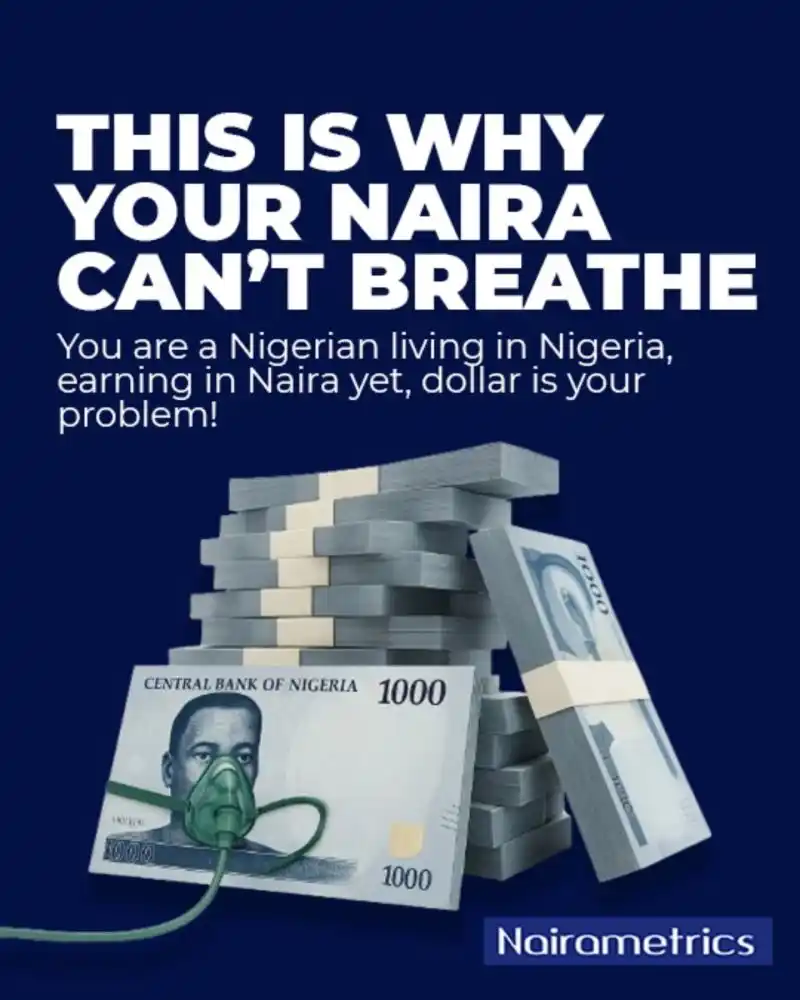

I was speaking to an investor recently and he said to me: "Before I invest in any business, I need to know the founders. Because no matter how good the idea is, the people behind it matter more." That investor’s statement is spot on. why? Because everything we build—families, businesses, communities, nations—rests on one thing: People. People. People. Simply, great people build great things. And where people are weak, underdeveloped, or disempowered—nothing lasting can stand. This investor understand this construct deeply that "companies are powered by people" If you give weak people the best idea, they’ll destroy it. But give great people a flawed idea, and they’ll refine it, scale it, and change the world. Essentially, if you want to build something meaningful: Don’t start with structures. Start with people. Can your people learn fast, unlearn faster, and stay obsessed with growth? If the answer is yes—everything else will align. If no—your business may collapse under its own weight. PS: Join the next Tekedia Mini-MBA starting June 9 to explore how the people factor shapes the foundation of great companies. Because behind every enduring business is a team that thinks, learns, and leads differently. Contact Eyitayo Adeleke to begin your registration today. Email: [email protected] Whatsapp: +2347035670954
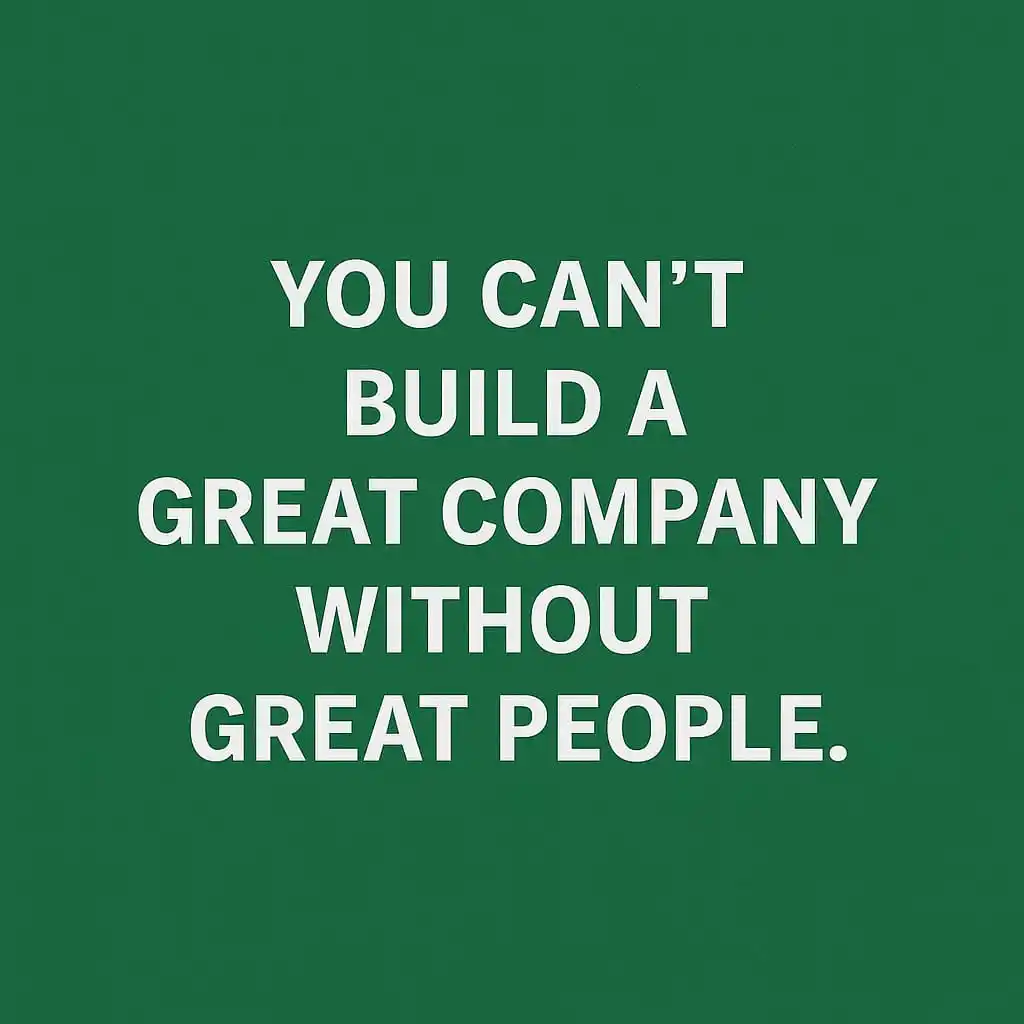

Market Size ≠ Market Opportunity Nigeria has over 210 million people. That doesn’t mean you have 210 million customers. Real market size is about: Who can afford your product? Who wants it enough to pay? Who has the means to keep coming back? Ignoring this can kill your business before it begins. Build for paying customers. Not just raising money from VCs. PS: We are starting new Edition of Tekedia Mini-MBA June 9, 2025. To begin your registration, chat +2347035670954
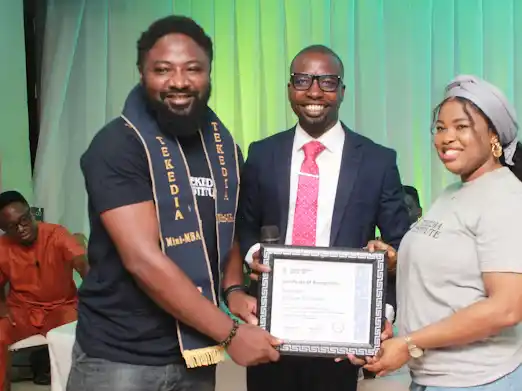

Every great thing ever achieved had one common denominator: someone began something. For a baby, for an adult; for a company, for a nation; the most difficult step to take is the FIRST STEP. But if you summon the courage to do it, it is a magical feeling. A baby, on the first step, is more likely to fall forward than fall backward. And just like that, inaction is history. Take your FIRST STEP on something productive this June. It may not be perfect on day one but it is certainly better than inaction. Take action. Take the first step in this second half of 2025.

The Sukuk story has proved it: Nigeria has abundance. We must now unlock it. I followed the story carefully. What did I observe? Capital is not scarce in Nigeria. DMO offered ₦300bn Sukuk. The market responded with ₦2.2 trillion. That is 735% oversubscription, in a market many call “capital-starved.” That response is not the behaviour of a capital-starved market. That is the behaviour of a market waiting for well-structured value to unlock its abundance. And here is the lesson for me: The question is not if opportunity exists rather it should be whether we’ve done the work to discover it and build for it. What product, service, or platform are you building that can trigger the same fast release of capital? Once that is discovered, abundance will not delay. Nigeria remains a great place to build. TGIF
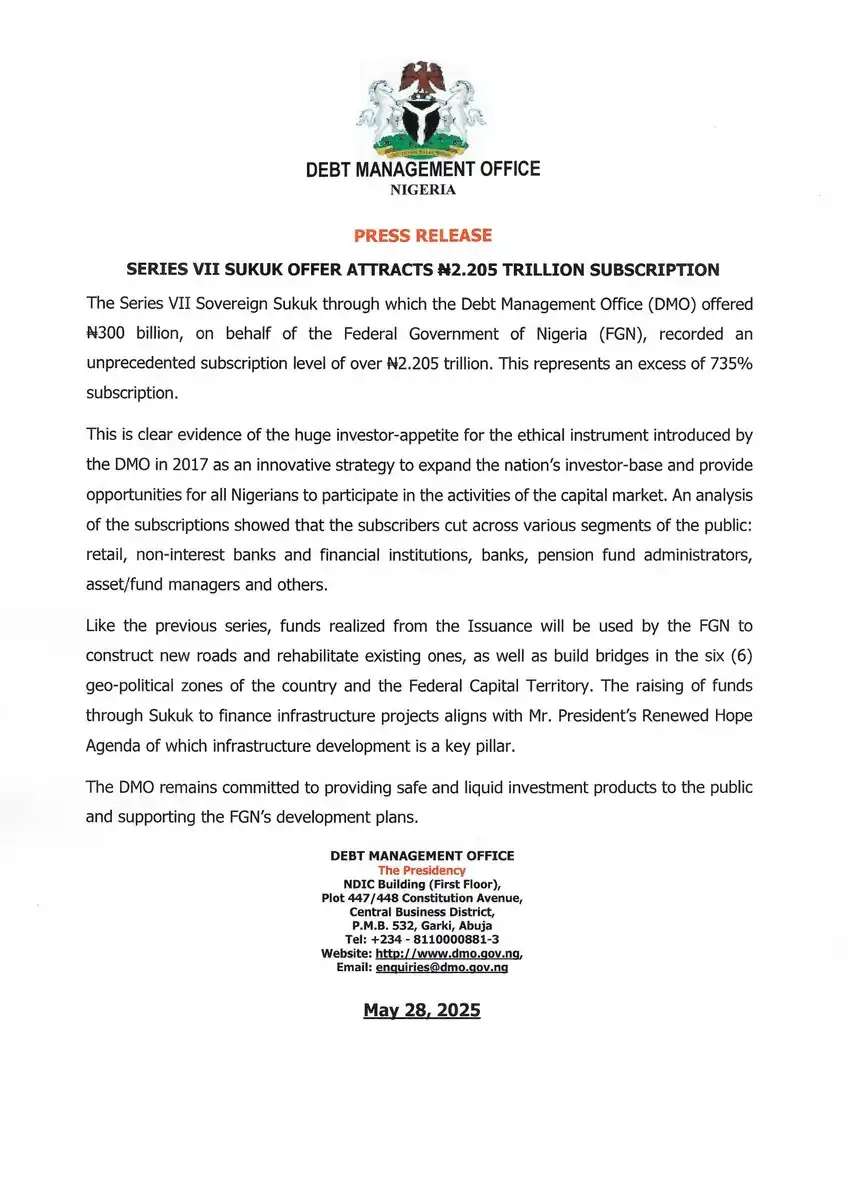

Good people, A few days ago, I shared a personal, non-academic reflection on the recent FGN Sukuk bond rollout. I didn’t expect the level of engagement it would spark—but I’m deeply encouraged by the depth, civility, and diversity of perspectives that have emerged. I will like to update that the Federal Government of Nigeria has officially closed its ₦300 billion Series VII Sovereign Sukuk Bond offer. Opened on May 12 and closed on May 20, 2025, this 7-year bond offers a rental return of 19.75% p.a., maturing in 2032. This closure aligns with the predefined subscription period outlined in the offer circular and does not necessarily indicate that the full amount was raised. While the Debt Management Office (DMO) has not yet released an official statement confirming whether the entire ₦300 billion target was met or if the offer was oversubscribed, the closure signifies the end of the subscription window as planned. I am making this update to thank contributors to my earlier post on this subject whose insights elevated the discussion, you didn’t just share opinions; you educated. One comment I keep revisiting is from PETER EJIMUDO, who said: "In a place like Nigeria, Individuals with illegistate wealth or money outside the banking system—whether from money laundering, ransom, or corruption—is a real concern. Buhari’s coercive approaches didn’t work. But strategic instruments like this attract such funds back into the formal system. For the government, it’s a win. For these individuals, it's a legal channel to reintegrate funds—while earning good returns." We don’t talk about that enough. That perspective alone deepened my entire understanding of government policy strategy. Another comment from Mustapha Bello, who said: “Sukuk bonds may not make you rich, but they’re peace income assets—they bring steady cash flow and help ease financial stress, especially when things get unpredictable.” That term—peace income assets—is something I won’t forget. Because the Sukuk bond, like other fixed-income securities, is deeply tied to investor risk appetite—and it plays a very strategic role in portfolios diversification for people who are risk-averse. Some individuals simply do not like risk—they don't want volatility, speculation, or sleepless nights wondering if their capital will disappear. For these investors: Stocks feel too volatile Crypto feels like a gamble Real estate is capital intensive and illiquid But Sukuk bonds offer stability, predictability, and peace of mind. In short, what started as a post became a classroom—and everyone brought their best self. Thank you one & ALL.


You see, a lot of people are obsessed with building the perfect product. But listen: the smartest companies don’t just build products—they pay attention to their business model. Because business models are strategic weapons in the market and the company with the best business model wins. Recently, I saw two breaking news: 1. Airtel Africa Partners with SpaceX to Launch Starlink Across 14 African Markets 2. UBA Expands Agent Banking with 46,000 RedPay PoS Terminals From the surface many will interpret these moves by both companies as mere attempts to build better services or increase market presence. But here’s the truth: these are strategic moves to elevate and update their BUSINESS MODELS—not just add products. In today’s fast-changing economy, success is no longer about building products. It’s about evolving business models to meet shifting market dynamics and changing customer demands. Airtel and UBA are signaling that they understand this deeply. They are redesigning how they create, deliver, and capture value in real time and every one should pay attention. We have a module in Tekedia Mini-MBA that focuses on "The Supremacy of Business Model". The module explains the difference between surviving market changes and thriving through them. If you see these moves only as product upgrades, you’re missing the bigger, strategic picture. Airtel and UBA aren’t just adapting; they’re transforming their business DNA to unlock long-term growth and relevance. Airtel is using strategic partnerships and cutting-edge technology (like Starlink) to redefine connectivity, while UBA is deploying large-scale infrastructure to provide financial inclusion and capture market share from fintech rivals. Both companies are focusing on the model that is currently working in the market, not just product, proving that a well-defined business model can be the key to unlocking sustainable growth. In the end, business model supremacy will determine the winners in the market, and Airtel and UBA’s innovations show that they are positioning to lead. PS: The next Tekedia Mini-MBA is starting June 9, 2025. Contact Eyitayo to begin your registration today. Email: [email protected] Whatsapp: +2347035670954
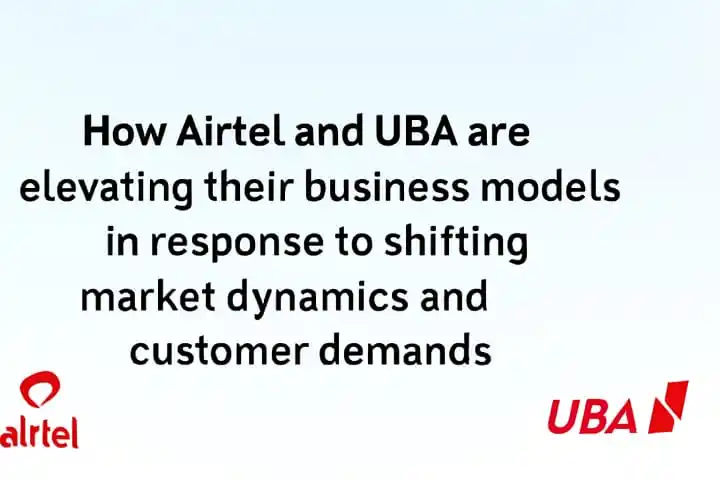









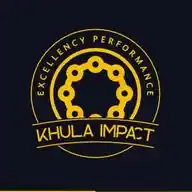
![★彡[ᴛʜᴇ ᴋᴇɴʏᴀ ᴛᴇᴀᴄʜᴇʀꜱ' ᴊᴏʙꜱ & ᴜᴘᴅᴀᴛᴇꜱ ᴄʜᴀɴɴᴇʟ (ᴛ.ᴋ.ᴛ.ᴊ.ᴜ.Ç)™]彡★ WhatsApp Channel](https://cdn1.wapeek.io/whatsapp/2025/02/26/18/shan-the-kenya-teacher-job-and-update-channel-tktjuctmshan-cover_cb07575a08217cf7521052c1fadce650.webp)
